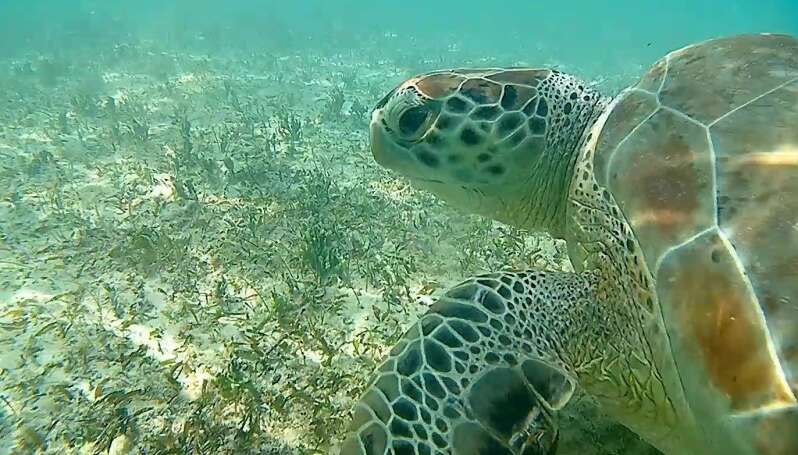Recent News
Flatts fuel spillage poses negligible riskTuesday, October 31, 2017
A fuel spill at the Rubis gas station in Flatts Village poses a negligible risk to the environment, according to experts.
‘Citizen Scientists’ Health Check Bermuda Reefs
Friday, October 27, 2017
For the fifth consecutive year, the Bermuda Zoological Society event REEF Watch trained teams of corporate professionals, teenagers and families to conduct coral reef surveys, fish counts and assessments of our reef ecosystem.
Global Indemnity Re Donates To Local Charities
Thursday, October 26, 2017
Masterworks Museum of Bermuda Art has praised Global Indemnity Re for their annual charitable giving programme after the arts and education organization was one of four local charities awarded.
Project reveals turtles are on the move
Wednesday, October 25, 2017
Almost 200 turtles were plucked from the island’s waters this August as the Bermuda Turtle Project continued its conservation work.
Dr. Wingate On “Man’s Impact On Bermuda”
Saturday, October 21, 2017
The Bermuda Underwater Exploration Institute [BUEI] and Bermuda Zoological Society [BZS] are getting set to present “Man’s Impact on Bermuda” with Dr. David Wingate on Thursday, October 26, beginning at 7.00pm.
About
GovernanceAbout Us
Newsletter
Latest News
Gift & Bookstore
Contact
General Inquiries
info@bzs.bm
Latest News
All the latest updates and news from the Bermuda Aquarium, Museum, and Zoo, one of Bermuda's leading visitor attractions!

Many acres of seagrass beds crucial for the survival of sea turtles and other marine life have “completely collapsed” over the last four years, according to a leading environmental group.
The Bermuda Turtle Project says “immediate changes” are needed to save the remaining seagrass beds and to help new ones to grow.
While praising the conservation and research efforts already being carried out by the Department of Environment and Natural Resources to protect seagrass habitats, Jennifer Gray, director of the Turtle Project, said more needs to be done in an opinion piece which appears on the Opinion section of The Royal Gazette today.
Ms Gray said the Bermuda Turtle Project (BTP) is resuming its in-water research this week after a 24-month absence caused by the Covid-19 pandemic, but added it is already clear from observations “there have been some drastic changes in our marine environment”.
She said: “Once thriving seagrass beds have been in decline for some two decades, but over the last 48 months many acres of this critical habitat have completely collapsed with not a blade of grass left.
“Along with the disappearance of seagrass comes numerous consequences comprising disturbance and shifting of the marine sediments that were once held stable by the root systems of the seagrass and a vulnerability to the arrival of potentially invasive species, especially algae.
“Even more troubling is the seeming departure of once-visible species like fish and sea turtles. BTP has been documenting a change in the size class of green turtles on the Bermuda platform that shows green turtles departing our shores at a smaller size than they once did.”
Ms Gray said it is likely that some sea turtles are still living around Bermuda and may have changed habitats.
“We need to get out there and conduct our research to obtain a clearer picture of what is happening,” said Ms Gray.
“We know there are still turtles here, and that they appear to be utilising new habitats around the island. There have been observations of small green turtles feeding on algae and even mangrove leaves, perhaps making a diet change rather than risking a migration. Further studies are essential and will help fill in the blanks on what, exactly, is happening with sea turtles in Bermuda.”
She said research is also needed on other causes of seagrass decline including seagrass pathogens and disease, some of which have wiped out similar habitats on the US coastlines and could have easily arrived in Bermuda.
In the meantime, she said other immediate steps can be taken to arrest the decline in the seagrass and sea turtle and fish populations.
These include protecting sharks and other natural predators in order to return to a more natural balance in the food web and ecosystem and Introducing marine protected areas (MPAs) where harmful fishing practices, anchoring, engine outputs and propeller scarring are eliminated.
“This would afford a better chance for seagrass recovery and the return of juvenile fish which, when they multiply, would spill outside the protected area, providing an increase in abundance in areas where fishing does take place.”


